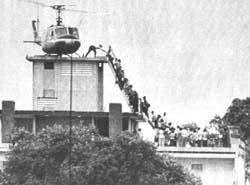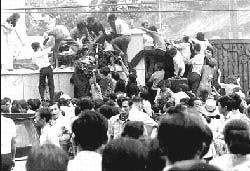 |
International Affairs
A New Congress – A New Vietnam?
Toby Westerman
Most mainstream media sources assert that a Democrat Congress is an inevitability in the upcoming election. Pro-Democrat media pundits are comparing the war in Iraq to the Vietnam quagmire of the late 1960s and early 1970s. Case in point, President Bush's remark regarding the "Tet Offensive" and the subsequent misinformation by the media that he conceded the Iraq war a failure.
An examination of the Vietnam War era is, some assert, warranted. Was a Democrat Congress an integral part of Vietnam's conclusion that resulted in the death of thousands of people and a humiliation from which America is still recovering?
In the early 1960s the mainstream media was agitating for an immediate withdrawal from Vietnam. On February 27, 1968, CBS News legendary journalist Walter Cronkite predicted failure in Vietnam, stating, "the enemy can match us" in all military aspects. On March 10 of the same year, an NBC program asserted "we must decide whether it is futile to destroy Vietnam in order to save it." Five days later, Time magazine asked if victory is "beyond the grasp of the world's greatest power."

South Vietnamese civilians scramble to board the last US heliocopter

Thousands of Vietnamese try to enter the American Embassy

South Vietnamese fleeing Saigon

A Communist Vietnamese tank crashes the gates of the Presidential Palace |
Even as President Nixon was withdrawing American troops from Vietnam, Democrat forces in Congress were pushing for a fixed withdrawal date of all U.S. troops. Former Secretary of State Henry Kissinger wrote in his book, Diplomacy, "Proposals for a fixed deadline for withdrawal quickly became the staple of anti-war Congressional resolutions (there were some 22 in 1971, and 35 in 1972). Their nonbonding nature gave their sponsors… dissociation from the administration without responsibilities for the consequences."
The American Democrat Congress sat complacently as Communist North Vietnam broke peace accords and invaded the South. The freedoms and liberty purchased for the South Vietnamese by the lives of 50,000 Americans were being erased.
In June 1973, as Communist troops and tanks poured into South Vietnam, our Democrat Congress refused to approve military assistance for the South. In August 1973, aerial reconnaissance funding was cut. Our Democrat Congress slashed non-military economic aid to the South in 1973 to $1.4 billon from $2 millon in 1972. The Democrat Congress claimed these funding cuts would save lives and finally end a war America wanted to forget.
In January 1975, as North Vietnamese tanks barreled toward Saigon, U.S. President Gerald Ford warned the Democrat Congress that, "American unwillingness to provide adequate assistance to allies fighting for their lives could seriously affect our credibility throughout the world as an ally." In March 1975, Ford warned the Congress that American prestige, honor, and security were imperiled.
Still the Democrat Congress did nothing.
With all hope of aid blocked, South Vietnam's final tragedy began. Over one million refugees fled the Communist onslaught. Driven by fear escalating into panic, terrified refugees clogged the roadways and airfields around the South's capital, Saigon. The tidal wave of refugees included Catholics, anticommunists, political administrators, soldiers, intelligence agents, as well as numberless women and children who supported America, fled certain imprisonment and execution. Confronted by this spectacle of mass human suffering, the Democrat Congress did nothing.
By April 21, red forces began to close in around Saigon. The government of South Vietnam abdicated. Marines evacuated American officials and diplomats by helicopter from the U.S. Embassy's rooftop. Countless men, women, and children begged to come, fearing impending Communist retribution for their support of the Americans. As the helicopters lifted into the air, hundreds of Vietnamese flayed their arms in hopeless pleas for rescue.
Across the U.S., newscasts broadcast the unbelievable: the United States in full retreat. The images of American helicopters abandoning thousands of people have been etched in America's memory as one of the most humiliating moments in U.S. history.
North Vietnamese tanks smashed into the grounds of the U.S. Embassy. Photos of jubilant Communist soldiers, raising scarlet flags where the Stars and Stripes once waved, augmented America's humiliation. The most powerful nation in the world appeared defeated and humiliated at the hands of a relatively ill-equipped guerrilla army.
The media portrayed the defeat that they had helped bring about as the inevitable outcome of a war they did not support. The Democrat Congress refused to aid South Vietnam, turned its back on its Vietnamese allies, and handed victory to Communist troops.
Even before the final, tragic act of South Vietnam's death agony was played out, the Democrat Congress began to turn its attention to America's intelligence community. In 1975, the Democratically controlled Congress began to restrict operations of the Central Intelligence Agency, and eventually constructed the "wall" of separation between domestic and foreign intelligence agencies, which contributed significantly to the successful terror attack against the U.S. on September 11, 2001.
One of the most enthusiastic supporters of this "wall" is Nancy Pelosi (D-CA), who is campaigning strenuously to become Speaker of the U.S. House of Representatives.
America is presented with the prospect of another Democratic Congress which would again abruptly retreat in the face of a determined enemy. This time, however, the scenario would be substantially different. When America abandoned its allies in Indo-China, the victorious Vietnamese Communists could not pursue the retreating Americans.
Today, however, the terror forces active in Iraq, unlike the Communist Vietnamese of the 1970s, have already shown that they can and will strike the United States. A precipitous withdrawal from Iraq will only whet the appetite of the terror fanatics. No matter what the declared intentions of Congress, terrorist leaders will interpret a hasty retreat from Iraq as weakness and cowardice.
Any hint of fear or wavering will excite contempt among the terrorists and will lead to more direct, and possibly devastating, attacks upon the U.S. homeland.
A possible new Democrat Congress, still hostile to a strong U.S. defense, and suspicious of effective intelligence operations, would strike crippling blows against America's war on terror. The issuance of Congressional subpoenas would undermine the intelligence community's struggle against terror networks. The new Congress could also slash funding for military operations against terrorist paramilitary units. Once again humiliating defeat would haunt U.S. forces, instead of a needed victory.
Judging from statements of the Democrat leadership, a Democrat Congress would bear profound and potentially tragic similarities in beliefs and priorities to the Congress of the Vietnam War era.
The safety and security of the United States stands in the balance as the November 2006 election quickly approaches.

Posted November 3, 2006
Toby Westerman writes and edits
International News Analysis - Today
An investigative, analytical, and uncompromising weekly analysis of the world situation
Contact T. Westerman at www.inatoday.com
or P.O. BOX 5182, Rockford, ILL, 61125-0182
This article was published in the October 30, 2006 online edition of INA Today
|
International Affairs | Hot Topics | Home | Books | CDs | Search | Contact Us | Donate

© 2002- Tradition in Action, Inc. All Rights
Reserved
|
 |
|